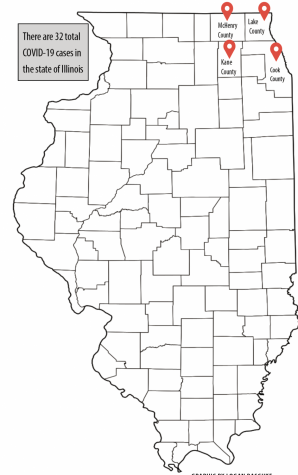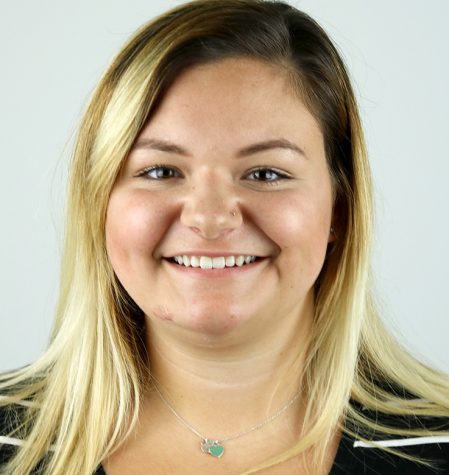Students react to extended spring break after COVID-19 concerns
March 12, 2020
Eastern’s spring break officially begins at 8 p.m. Friday, when students are expected to be out of the residence halls to begin what was originally planned to be a week-long break but has since switched to a two-week-long break, followed by online-only course instruction because of the COVID-19 outbreak.
Students have the option to return to campus March 23 or stay home for the remainder of the semester. Classes will not resume until March 30. 
Amid the pandemic, some students were glad to learn their spring break was extended, and some students immediately wondered what will happen when classes continue.
Art majors are worried about how they will be graded for performances that usually happen in person, biology majors are wondering how they will complete lab assignments and education majors want to know how they will meet their practicum requirements.
Class field trips, extra credit opportunities, theatre performances, voice recitals and other in-person events expecting 50 people or more have been canceled, according to Eastern President David Glassman’s email sent Thursday morning.
Alex Mann, sophomore history education major, said she does not agree with the extent of Eastern’s decision to cancel events after spring break, but she does understand why.
“I think it’s a lot of hysteria over something that might not be that big of a deal,” Mann said. “I understand the purpose of what’s going on and why they’re doing what they’re doing; it’s just hard overall … I think if we maybe went until April, it makes more sense, especially when it comes to canceling a lot of activities that are going on.”
As an EIU Dancer, Mann said the group had been working on their big showcase since September, which they will not get to perform now since the event has been canceled.
Danny Becker, senior theatre arts major, said there was not much preparation beforehand.
“It makes sense to do this, it just isn’t fair to faculty and students to not have a backup plan for something like this in place,” Becker said. “And I’m sure you have professors that protest D2L that now have to actually learn how to use it going in blind.”
Students like Sarah Mummel, junior environmental biology major, are not satisfied with Eastern’s decision to move online.
“I think it was a poor assessment of all class structures,” Mummel said. “The majority of my biology classes cannot be fully taught online.”
Mummel said some of her professors have never used D2L, and she does not think the hands-on science classes will transition to online platforms well.
“So much of the lab structure is spent analyzing, feeling and understanding how specimens look, sound and act in the wild that it doesn’t make sense to replicate that online,” Mummel said. “I think you really lose the integrity of the class.”
Robert Harper, freshman construction management major, said the switch to online-only classes is going to be difficult to get used to.
“The fact that we’re going to be taking all of our classes online, that’s going to kind of suck,” Harper said. “I won’t actually be able to get hands-on instruction from my teachers.”
Shanon Hutchinson, freshman biological sciences major, said she was initially happy learning students get an extra week for spring break, but then heard from other students that the transition could be difficult.
Most of Hutchinson’s classes involve the use of the chalkboards and whiteboards, and she said using D2L was unusual for her classes unless she was looking for her grades.
“I feel like it’s going to be more challenging for students, (faculty) and for staff,” Hutchinson said. “I’m not as happy about it anymore as I was in the beginning because all I heard was two weeks spring break. Now it’s just kind of stressful.”
Over the break, Hutchinson said she is going to have to work on her self-discipline, especially since she will have to work on a computer, which she said she does not like to do when it comes to schoolwork.
“I mean if I have to write a paper, sure, but in terms of actually following instructions and making sure everything is done correctly, I feel like I’m going to struggle with that a lot,” Hutchinson said. “It’s going to be a rollercoaster of stress and emotions and things that I wouldn’t be feeling if we had that face-to-face contact in class.”
Makayla McPhedran, sophomore vocal music education major, said she was worried about how the online transition will affect the arts majors specifically.
All of the musical ensembles, performances and lessons need to happen in person for things to work effectively, McPhedran said.
“As a music major and as a singer, I’m very worried about voice lessons and ensembles, and I’m sure there’s more that I’m forgetting,” Mann said. “I’m also in a speech class, so that might be interesting. There’s no required technology for these classes, so setting that up is also going to be a challenge.”
Becker said he cannot learn without the hands-on experience.
He was supposed to design costumes for the next production, which would have been his first time doing so before going to graduate school for costume design, he said.
“You can’t really act without practicum courses, and you can’t build a set with no show,” Becker said. “It will be fine, but it’s harder for the arts to teach with no in-class lab experience. I have no computer, so learning online is difficult without the facilities we have on campus.”
Mann said voice recitals and theater performances are part of some students’ grades, so she is unsure of what will happen with that.
“I think going online will honestly be OK, but I genuinely do like going to class and seeing friends, so I think that’s what I will miss more,” Mann said.
Seniors like Jonathan Burke, civic non-profit leadership major, are set to graduate May 9; however, the possibility of that being canceled is a concern for other seniors.
“Worst case, if we don’t have graduation, we don’t have graduation. I don’t want to sit in a sweaty room anyway,” Burke said. “So, I’m kind of cool with it, but I mean I’m sure my grandparents want to come see me graduate, but it’s probably unsafe for them to come, honestly.”
Freshman undecided major Michael Bates works at the front desk in Taylor Hall and said he was still undecided whether he will return March 23.
“A lot of people have to come back for work,” Bates said. “Like for me, I don’t know if I’m going to come back for work yet. No one’s going to be here. Everyone’s going to be home.”
As for the potential of COVID-19 spreading to Charleston, Bates said he feels like it is time to worry.
“I always saw the coronavirus as just a giant meme,” Bates said. “It was like the World War III memes, like, ‘Ha, we’re going to get drafted.’”
Analicia Haynes, Allison Little and Ryan Meyer contributed to this article.
Hannah Shillo can be reached at 581-2812 or hlshillo@eiu.edu.
















![[Thumbnail Edition] Senior Foward Macy McGlone, getsw the ball and gets the point during the first half of the game aginst Western Illinois University,, Eastern Illinois University Lost to Western Illinois University Thursday March 6 20205, 78-75 EIU lost making it the end of their season](https://www.dailyeasternnews.com/wp-content/uploads/2025/03/WBB_OVC_03_O-1-e1743361637111-1200x614.jpg)






















































